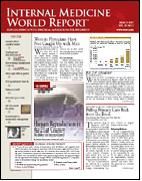Vardenafil Boosts Erectile Function in Men with Diabetes Who Don%u2019t Respond to Sildenafil
Vardenafil Boosts Erectile Function in Men with Diabetes Who Don’t Respond to Sildenafil
ORLANDO—New data suggest that vardenafil (Levitra) decreases the severity of erectile dysfunction (ED) in men with diabetes who were previously unresponsive to sildenafil (Viagra) irrespective of their level of glycemic control, according to results presented at the American Diabetes Association meeting.
Lead investigator Culley Carson, MD, of the University of North Carolina at Chapel Hill, said that these findings are important because ED is an especially challenging problem in diabetic patients. “More than 50% of diabetic men develop erectile dysfunction within 10 years of being diagnosed with diabetes, and erectile dysfunction tends to be less responsive to treatment in diabetic men,” he noted.
The results are also important because men with diabetes and ED need additional treatment options besides sildenafil. “Despite the initial success of sildenafil as a treatment for erectile dysfunction, clinical practice surveys have reported that up to 50% of men discontinue sildenafil therapy,” said Dr Carson. “In an international survey of 3291 men with self-reported erectile dysfunction, 23% of those who had previously used sildenafil more than once were dissatisfied with their therapy. Lack of efficacy and reliability were the most common reasons for discontinuation.”
The study randomized 463 men (aged, ³18 years) to 4 weeks of treatment with vardenafil, a selective phosphodiesterase type 5 (PDE-5) inhibitor, 10 mg, or placebo. Patients had the option to maintain or titrate their dose based on efficacy and tolerability after each of 2 consecutive 4-week treatment intervals. All participants had ED, as defined by the National Institute of Health Consensus Statement and were sildenafil nonresponders by history, defined by 6 criteria (ie, no response to 100 mg of sildenafil).
Study end points included the 30-point erectile function domain score and responses to the Global Assessment Question (GAQ): “Has the treatment you have been taking over the past 4 weeks improved your erections?” Responses were analyzed by hemoglobin A1C (HbA1c) level.
At baseline, the mean erectile function domain scores for vardenafil and placebo groups were 9.3 and 9.7, respectively, indicating severe ED. Results showed that vardenafil was superior to placebo on both efficacy measures. Vardenafil increased mean erectile function domain scores to 17.6, or moderate ED. In contrast, mean erectile function domain scores increased to only 10.5 in the placebo group.
In addition, erectile function domain scores improved in all glycemic control subgroups. For example, in patients with the worst glycemic control (ie, HbA1C level >8% £12%), erectile function domain scores improved from 8.0 (severe ED) to 16.3 (moderate ED).
Overall, GAQ response rates were 62% in the vardenafil group and 15% in the placebo group. In all glycemic control subgroups, the proportion of patients with improved erections was roughly 4-fold greater than in patients receiving placebo. Vardenafil was generally well tolerated, with adverse events mostly mild-to-moderate in intensity and similar to those expected with an PDE-5 inhibitor.
“Overall, the results demonstrate that vardenafil significantly improves erectile function in men who are nonresponsive to sildenafil by history, even if they have poor glycemic control,” Dr Carson noted. “The efficacy of vardenafil in this difficult-to-treat population may improve patient satisfaction with oral erectile dysfunction therapy.”
